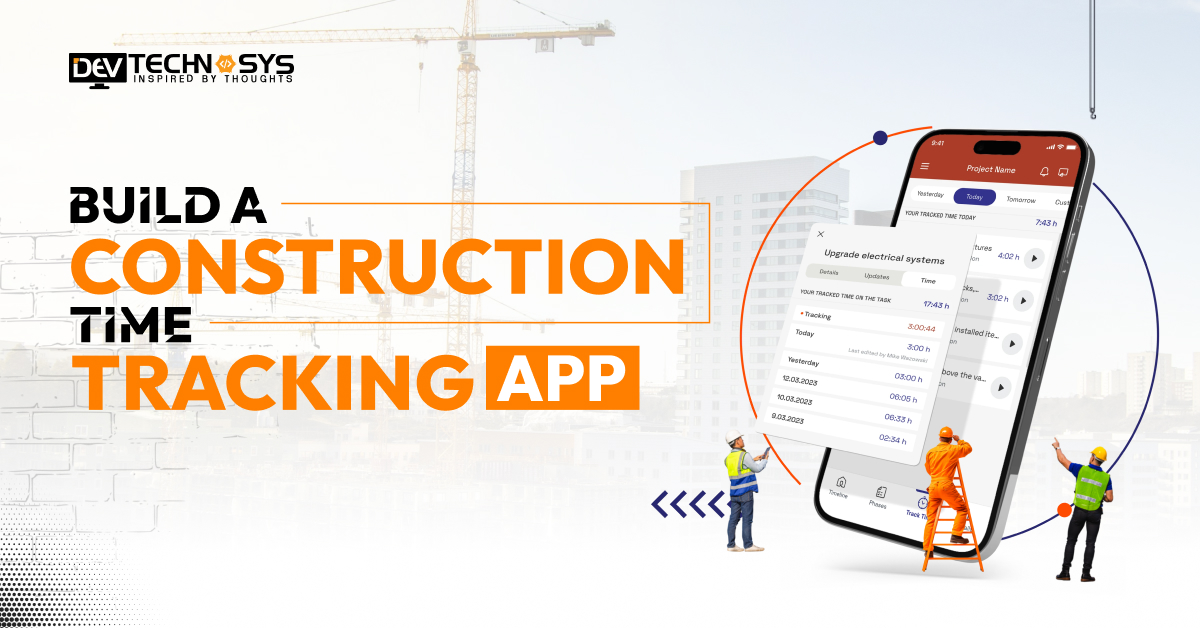“Build your business a successful one by creating a construction time monitoring app.”
Are you looking to deliver a smart worksite solution? To streamline the ordinary construction services, it is beneficial for businesses to build a construction time tracking app that delivers various features at affordable rates. The labor industry needs such solutions to make the process more efficient and productive resulting in business growth.
To create a construction time tracking app, it is necessary to know various aspects like related cost factors, monetization, tech stack, features, and top brands in the industry. You need a reliable source to get information on these topics.
So, in this blog, we are delivering all the details with authentic sources. Let’s get started and know more about construction management software.
What is a Construction Time Tracking App?
A digital tool called a construction time tracking software assists field workers, contractors, and project managers. It helps in recording work hours, keeping track of attendance, and managing productivity on the job site in real time.
In construction operations, hiring an Android app development company may improve efficiency and lower labor costs by streamlining payroll, increasing responsibility, and offering data-driven insights.
- The global construction management software market was valued at $9.6 Billion in 2023.
- Expected to reach $18.2 Billion by 2030, growing at a rate of 5% CAGR from 2023 to 2030.
- North America holds the largest market share due to high digital adoption in construction.
- 80% of large construction firms use time tracking or project management software.
- Mobile-based construction apps contribute to over 60% of total software usage on worksites.
![]()
How Does Construction Time Tracking App Work?
Using mobile capabilities, a construction time monitoring app assists in keeping track of worker hours and progress. It increases payroll accuracy and job site productivity by automating data collecting:
![]()
1. Track Employees & Workers
Workers clock in/out using mobile devices or time clocks, with GPS ensuring location accuracy. This allows managers to monitor attendance and work hours in real time.
2. Real-Time Data Sync
Time entries, project updates, and worker locations sync instantly to the cloud. Managers can access the latest data across devices, improving oversight and decision-making.
3. Task & Project Allocation
You can build construction management software for managers to assign specific tasks or project codes within the platform. Workers log hours against these assignments, providing granular visibility into project progress and labor costs.
4. Data Analysis & Reporting
The app compiles tracked data into actionable reports. These insights help optimize workforce productivity, track project budgets, and ensure compliance with labor regulations.
5. Integrate Payroll
Seamless integration with payroll systems automates wage calculations. Accurate, approved timesheets flow directly into payroll, reducing errors and administrative work.
Benefits of Creating Construction Management Software
Project planning, monitoring, and reporting are centralized on a work tracking platform. Businesses can develop a construction time tracking app that improves productivity, openness, and cooperation:

1. Improved Project Visibility
The program offers progress monitoring and real-time dashboards. Stakeholders can keep an eye on work accomplishment, budget status, and project milestones. This openness facilitates proactive problem-solving and decision-making.
2. Enhanced Productivity
The amount of manual labor is decreased by automating repetitive processes like scheduling, time tracking, and document management. By concentrating more on essential construction tasks, teams can expedite project completion and boost overall output.
3. Cost Control
The program provides forecasting and the low cost to make a construction time tracking app. Managers are able to keep an eye on spending plans, spot possible overruns early, and allocate resources. Use of fleet management software development services guarantees budgetary constraints.
4. Better Compliance
Automated documentation and built-in compliance checks guarantee that safety rules and legal requirements are followed. By keeping current records, the program lowers the possibility of fines, project delays and reduces the cost to build a construction time tracking app.
5. Optimized Resource Management
Software for construction management simplifies the distribution of workers and equipment. It aids in monitoring resource availability, efficiency, and utilization. Better planning, less downtime, and a higher return on investment are the results of this.
Interested in a chatbot demo, pricing, or more info? Fill out the form our expert will contact you shortly.
-
Chatbot Demo
-
Cost to Develop an app
-
Industry Report
-
Case Study
Using AI to Enhance Construction Software
AI is transforming construction software by making jobsite processes safer, quicker, and smarter. AI technologies improve decision-making and reduce the cost to develop a construction time tracking app.
It streamlines operations by automating repetitive tasks and forecasting project risks. A GPS tracking software development company ensures real-time project accuracy, cost control, and productivity all increase as a result.
- Predicts project delays through historical data analysis.
- Automates daily logs and worker time entries using computer vision.
- Optimizes resource allocation with AI-driven forecasting.
- Enhances safety through real-time hazard detection and alerts.
- Supports predictive maintenance for construction equipment.
![]()
How to Create Construction Time Tracking Applications?
You can build a construction time tracking app by following the below steps. They guide entrepreneurs to find different business models, develop the app, and launch in the market:
![]()
1. Find Target Audiences
Determine who will use your app first like HR teams, field workers, construction managers, and site supervisors. Recognize the difficulties by targeting construction IT solutions, which includes payment inconsistencies, distant coordination, and manual time logging.
Ask them about the features they would want to see before investing money to create a construction time tracking app. Divide audiences into groups according to project categories, firm sizes, or regions.
- Who will be the primary users?
- What are the most common pain points?
- What device types are used on the construction site?
2. Blueprint Planning
Describe the features of the app, such as real-time dashboards and GPS-based clock-ins TO REDUCE THE cost to develop a construction time tracking app. To illustrate the essential user experience, make flow diagrams and user stories. Plan the data flow, permissions, and admin and worker modules.
Select platforms and necessary integrations in advance. Calculate the resources and schedules needed for each stage. Alignment between the development and business teams is guaranteed by a solid plan.
- What core features are essential?
- How will the app support major functionalities?
- What integrations with existing tools are needed?
3. Hire Development Team
Select a talented development team with prior expertise TO make a construction time tracking app. Seek for knowledge of cloud backend systems, API integrations, and mobile app development. Examine earlier work, particularly time tracking or technologies tailored to a certain industry.
You can work with a specialized agency, independent contractors, or in-house developers. Make sure the team consists of a project manager, QA, and frontend/backend developers.
- How should we hire a specialized agency?
- Does the team have prior experience?
- What project management tools are needed?
4. UI/UX Designing
To specify the design and navigation of web and mobile interfaces, create wireframes. Put your attention on a simple, field-use-friendly design with features like big buttons, offline access, and few processes. When placing essential elements like punch-in/out, consider user personas as a guide.
Make sure the interface works on all devices and the branding is consistent. On-site training requirements are decreased and productivity is increased with good UX.
- How can we make the interface intuitive for workers?
- What layout works best for usage in bright sunlight?
- Should we design differently for admin dashboards?
5. Integration of APIs & Cloud
Incorporate payroll APIs, biometric technologies for safe logins, and GPS for location tracking. You can look for Android app developers for hire to implement data storage with cloud systems like AWS or Firebase. Integrate timekeeping rules through APIs to guarantee adherence to labor laws.
If necessary, enable integration with third-party programs like Procore, Slack, or QuickBooks. Provide safe APIs so that mobile apps can safely connect to the backend.
- Which third-party APIs are required?
- Which cloud provider offers the best security?
- How will real-time data sync between cloud and device?
6. Test & Deploy
Test functionality, UI consistency, performance, and edge cases using QA. A construction time tracking app development company creates scenarios with numerous uses like offline modes or bad network conditions. To stop illegal access or data breaches, test security procedures.
For practical validation, employ beta testing with a small number of actual consumers. Install the app on the appropriate web servers and app stores if it is stable.
- How will the app be tested for different network scenarios?
- What OS versions will be covered in testing?
- What is the plan for beta testing?
7. Secure & Support
Put in place secure authentication procedures, encrypted data storage, and role-based access. Update your software frequently to address vulnerabilities, add functionality, and resolve issues. Provide user assistance avenues like ticket systems, FAQs, and in-app chat.
Make regular data backups and adhere to disaster recovery best practices. Offer demos or training materials to ensure a seamless onboarding process for new users.
- What authentication methods will be implemented to ensure data safety?
- How will sensitive data be encrypted and stored?
- What channels will be available for technical support?
Incredible Features of a Construction Time Tracking App
By precisely tracking labor hours and activities, a construction time tracking app improves project efficiency. It contributes to cost reduction, increased productivity, and job site transparency:
![]()
1. GPS Location Tracking
Tracks the real-time location of workers to verify job site attendance. You can build an app like GeoZilla that ensures employees are clocking in and out from the correct location.
2. Biometric/QR Code Login
Enables secure and quick logins through fingerprint scanning or QR codes. Prevents buddy punching and ensures only authorized personnel record their time.
3. Task Time Tracking
Allows workers to log time spent on specific tasks or projects. Provides detailed insights into productivity and project costing.
4. Offline Mode
Businesses can develop a construction time tracking app that lets users track time even in areas with no internet connectivity. Data syncs automatically once the device reconnects to the network.
5. Real-Time Dashboard
Displays live data on workforce attendance, project progress, and time logs. Helps managers make informed decisions and respond quickly to issues.
6. Automated Payroll
Integrates time tracking data with payroll systems to calculate wages accurately. Reduces manual errors and streamlines the payroll process.
7. Photo/Note Attachments
Enables employees to upload photos or notes alongside time entries. Provides visual proof and context for work completed.
8. Overtime Management
Tracks and calculates overtime hours automatically. Ensures compliance with labor laws and company policies.
9. Project Management Tools
Includes tools for assigning tasks, setting deadlines, and tracking progress. So, it is beneficial to develop a construction calculator app that facilitates better coordination and project oversight.
10. Alerts & Notifications
Sends automated alerts for missed punches, overtime, or approaching deadlines. Keeps both workers and managers informed in real-time.
Advanced Features of Construction Task Tracker Apps
Construction job tracker apps offer smart capabilities that improve project management. To increase productivity and compliance, they make use of voice technologies, automation, and artificial intelligence:
![]()
1. AI-Powered Insights
Uses AI to analyze task data and project trends. Helps predict delays, optimize workflows, and improve future project planning.
2. Resource Allocation Forecasting
Forecasts labor and material needs based on current project data. Enables proactive resource management to avoid shortages or excess.
3. Voice Recognition Input
Allows workers to log tasks and updates using voice commands. You can develop construction fleet management software that speeds up data entry, especially in hands-busy construction environments.
4. Compliance Tracking
Monitors adherence to safety standards, labor laws, and company policies. Automates documentation to ensure regulatory compliance.
5. Workflow Automation
Automates repetitive tasks like approvals, notifications, and reporting. Reduces manual work and accelerates project progress.
Leading Construction Management Software
Workflows for project planning and operations are all streamlined by construction management software. These tools support building projects by increasing productivity and optimizing resource use:

1. Buddy Punch
Buddy Punch is a time-tracking program for employees that supports mobile apps, GPS location, and facial recognition. By automating timesheet approvals and tracking overtime, it streamlines payroll processes. The cost to create a construction time tracking app is low for such platforms.
- GPS & IP Address Tracking
- Customizable Scheduling
2. Workyard
For field services and construction, Workyard provides GPS-based time tracking. It assists businesses with labor cost reduction, payroll accuracy optimization, and worker location and time tracking on construction sites.
- Precise GPS Time Tracking
- Real-Time Cost Reporting
3. Raken
Raken is a construction field management tool that prioritizes time monitoring, safety compliance, and daily reporting. Teams can use it to record field data, generate digital reports, and keep an eye on their projects in real time.
- Daily Reports & Field Logs
- Production Tracking
4. ClockShark
ClockShark offers field service and construction companies mobile time tracking and scheduling. Job costing, GPS-based clock-ins, and connections with top accounting systems are among the features. Businesses can look for mobile app developers for hire for creating such apps.
- Geofencing for Job Sites
- Job & Task Management
5. Clockify
For construction teams in need of basic project tracking, Clockify is a free time tracking solution. It provides various integration options along with time logging, reporting, and insights into team productivity.
- Multi-Platform Time Tracking
- Detailed Timesheets & Reports
6. Buildbite
You can make a construction time tracking app like Buildbite used for managing collaborative construction projects. To keep construction teams coordinated and projects on schedule, it integrates task management, real-time communication, document sharing, and photo recording.
- Collaborative Task Management
- Photo & Document Sharing
Tech Stack Used to Build a Construction Time Tracking App
A well-organized tech stack that guarantees real-time data syncing, safe access and scalability is necessary to manage the cost to create a construction time tracking app. The stack consists of cloud platforms, mobile development tools, APIs, and front-end and back-end technologies.
High performance, adaptability, and smooth integration with construction workflows are guaranteed by iPhone app development services the appropriate tools:
| Component | Purpose |
| React Native / Flutter | Cross-platform mobile app development for iOS and Android devices. |
| Node.js | Backend server logic and real-time event handling using JavaScript. |
| MongoDB / PostgreSQL | Database to store user data, time logs, project info, and site analytics. |
| Firebase | Real-time data syncing, push notifications, and crash reporting. |
| AWS / Google Cloud | Scalable cloud infrastructure for hosting, storage, and compute power. |
| RESTful APIs / GraphQL | Enable smooth communication between frontend and backend services. |
| Mapbox / Google Maps API | GPS tracking and site location visualization features. |
| OAuth 2.0 / Firebase Auth | Secure user authentication and access control for multiple roles. |
| Jest / Mocha | Automated testing frameworks to ensure reliability and bug-free code. |
| Docker / Kubernetes | Containerization and orchestration for efficient app deployment and scaling. |
What is the Cost to Develop a Construction Time Tracking App?
A number of technical factors affect the cost to build a construction time tracking app. Every element, from team experience to project scale, is vital in determining the budget. Planning effectively and preventing cost overruns are made easier with an understanding of these factors:
![]()
1. Project Complexity
The cost to develop a construction time tracking app with basic functions is less than those with GPS, biometric login, payroll integration, and analytics powered by artificial intelligence.
More testing and development time are needed for more complexity. The project’s total cost rises as a direct result.
| Project Complexity | Development Time | Estimated Cost |
| Simple | 2-5 months | $5000-$10000 |
| Moderate | 5-8 months | $10000-$15000 |
| Complex | 8-12 months | $15000-$20000 |
| Premium | More than 12 months | $20000-$25000 |
2. Demographic Needs
Features unique to a certain location like time zone handling, compliance rules, and language support, affect costs. Additional localization could be required if your program is intended for users from other countries. The construction time tracking app development cost is increased by these modifications.
| Demographic Needs | Estimated Cost |
| USA | $25000-$30000 |
| Australia | $20000-$25000 |
| India | $5000-$12000 |
| UK | $15000-$20000 |
| UAE | $8000-$15000 |
| Brazil | $12000-$16000 |
3. Platform Choice
The cost to develop construction fleet management software is greatly impacted by the decision between cross-platform development, iOS, or Android. Better performance is provided by native apps, but they are more costly, particularly if they are created specifically for each platform.
| Platform Choice | Estimated Cost |
| Native App | $10,000-$15,000 |
| Flutter App | $15,000-$18,000 |
| Hybrid App | $18,000-$20,000 |
4. Team Hiring
Your budget can be significantly altered by hiring a development agency, freelancers, or an internal team. Although they typically charge more, agencies provide end-to-end service and organized knowledge. Although freelancers are less expensive, they could not be consistent or dedicated over the long run.
| Team Hiring | Estimated Cost |
| In House Team | $5,000-$8,000 |
| Full-Time Freelancers | $3,500-$5,000 |
| Developer Outreach | $8,000-$15,000 |
5. Experience of Developers
They charge more per hour, but highly skilled developers produce faster turnaround times. Although they could cost less up front, junior developers need more time and oversight. Speed, stability, and total construction time tracking app development cost are all directly impacted by experience level.
| Experience of Developers | Cost Estimation |
| Junior/Entry-Level | $8000-$12000 |
| Mid-Level/Experienced | $12000-$16000 |
| Senior/Expert | $16000-$20000 |
| Professional | $20000-$24000 |
How to Monetize a Construction Management App?
Using a variety of revenue models is necessary to monetize a construction management app. You can make a construction time tracking app with add-on services and subscriptions to promote steady revenue:

1. Subscription Model
Charge customers a regular price to gain access to ongoing upgrades and premium features. This model guarantees a steady flow of income. For construction companies looking for dependable, investing money to develop a construction time tracking app is beneficial.
2. Freemium Model
Provide a basic version for free that includes the necessary tools, and urge users to upgrade to a subscription plan for more capabilities. Freemium aids in drawing in a large user base at first. The primary source of income is premium conversions.
3. Pay-Per-User Pricing
Fees are determined by the quantity of active users in each business account. You can hire dedicated developers to increase revenue by using this adaptable methodology. Small and medium-sized organizations find it appealing because they can begin small and gradually increase their usage.
4. Integration Fees
Charge for the integration of third-party technologies including ERP platforms, project management software, and payroll systems. This facilitates smooth workflows, which provides value. Integrations that simplify operations are frequently more expensive for businesses.
5. In-App Purchases
Directly within the app, offer extra features, modules, or services for sale. Custom reporting, offline capability, and advanced analytics are a few examples. This strategy generates additional income and helps to reduce the cost to build a construction time tracking app.
6. White Label Solutions
Other businesses who wish to brand your app as their own might purchase it as a white-label solution. Customization services and licensing fees are how this makes money. Software dealers and building consultants find it appealing.
In a Nutshell!!
Now, we have discussed the process to make a construction time tracking app with all the related topics in detail. So, it is the right time for businesses to start the mobile app development process by approaching a reliable IT consulting firm:
- Try to manage the cost to build a construction time tracking app.
- Use specialized construction time tracking app development services for app making.
- Study various business models and target one.
- Start implementing monetary methods to generate revenue.
These points will help you to gather targeted audiences in large numbers. Additionally, you can make a huge profit and grow your business easily.
FAQs
1. Which are the Popular Labor Tracking Systems in the USA?
Buddy Punch, Workyard, ClockShark, Raken, and TSheets by QuickBooks are well-known labor tracking systems in the United States. These solutions assist construction organizations with payroll processing, employee hour management, and job site attendance tracking.
2. How Long Does it Take to Build a Construction Time Tracking App?
It usually takes 3 to 5 months to create a simple construction time monitoring app. It might take 6 to 9 months for apps with sophisticated capabilities like offline mode, payroll interfaces, GPS, and compliance tracking. The size of the team, the development method, and scope modifications all affect the timeline.
3. What is the Maintenance Cost of Construction Progress Tracker Apps?
Annually, ongoing maintenance expenses usually fall between 15% and 20% of the original development expenditures. This covers feature improvements, security upgrades, performance optimization, bug corrections, and server maintenance.
4. How to Hire a Construction Tracking App Developer?
- Define your project scope.
- Search for developers with proven experience.
- Check portfolios and case studies.
- Conduct interviews to evaluate technical skills.
- Finalize a contract outlining timelines.
5. Which Industries Can Use a Worksite Tracking Application?
- Construction: For tracking labor, materials, and equipment on job sites.
- Manufacturing: For monitoring inventory, workflow, and employee activities.
- Mining: For ensuring safety compliance, equipment usage, and operational efficiency.
6. What is the Major Task of Construction Time Tracking Apps?
Accurately recording and managing employee work hours across several job sites is the main responsibility of a construction time tracking app. It assists with labor cost calculations, productivity monitoring, attendance tracking, and labor law compliance.






























